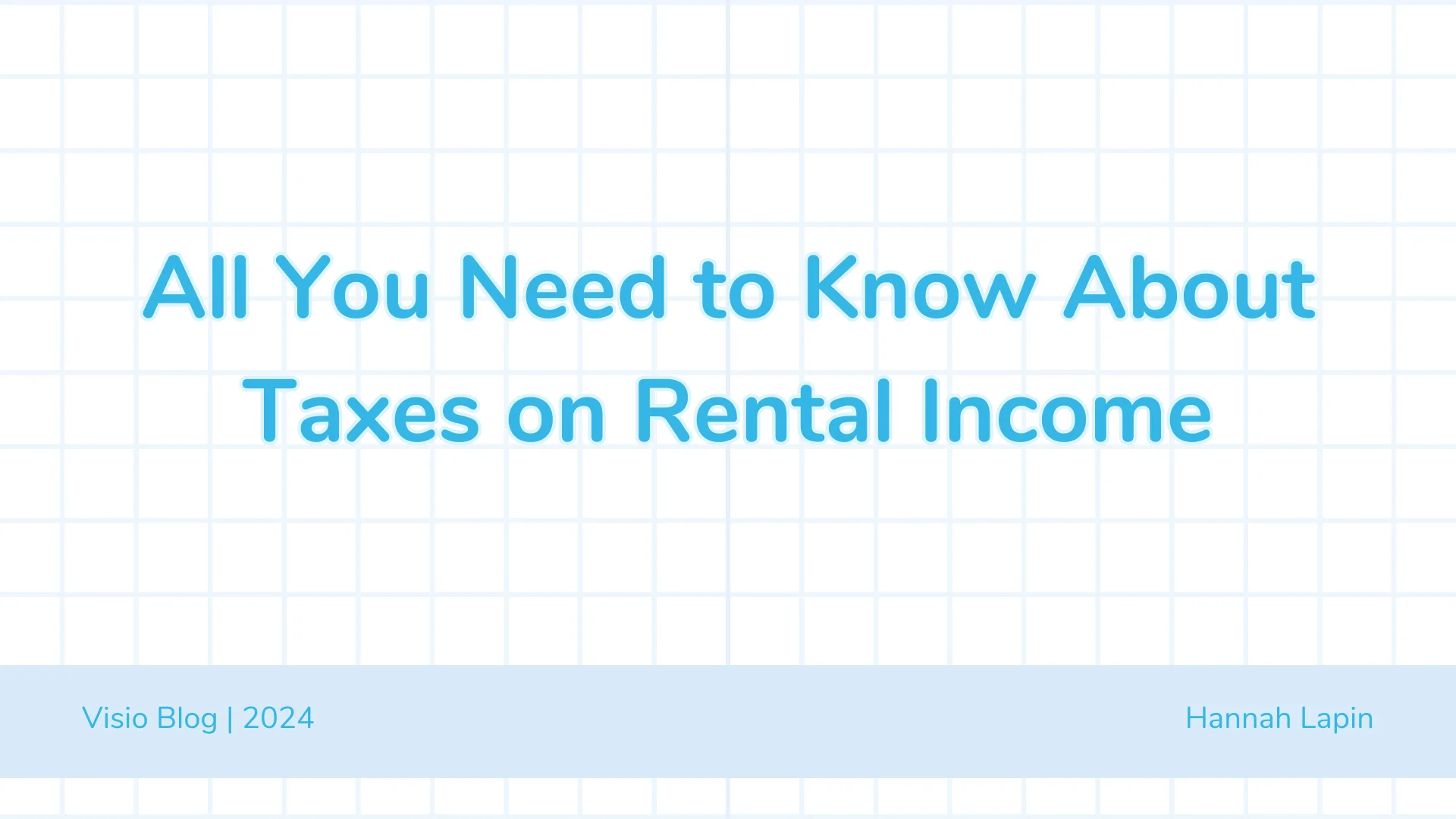Investing in real estate can provide you with passive income and generational wealth. However, as with any income, rental income is subject to taxes.
Preparing for your tax obligations and understanding how to offset your tax liabilities can help you prepare for tax season. Predicting gross income in proportion to your income tax obligations can also help you decide if a property is worth buying.
Tax laws require investors to report all income and expenses in the year they occur. This means you’ll report any rent payment you receive in the current tax year.
If a tenant is late to pay rent in December and you don’t receive that month’s rent until the following January, you won’t report it until next year’s return. The same goes for advance rent. If a tenant prepays a full year of regular rent payments, you should report the full amount as ordinary income in the year you receive it.
Similar to rent payments, you should also report any repairs or travel expenses in the same year they occur. You should also report property management fees in the year they’re paid, even if you prepay for a full year that spans into a new tax period.
What Counts as Rental Income?
Rental income includes any funds you generate from an investment property, which may include the following:
- Monthly rent: This is the monthly rental income you receive from tenants who live on the property. This includes any partial interest you may have in an investment property.
- Advance rent payments: The funds you receive from tenants prepaying rent are also taxable income. This may also include any first or last month rent you require before a new tenant moves into your property.
- Repairs from a security deposit: If you garnish a percentage of a tenant’s security deposit to cover repairs, it’s considered taxable income. Otherwise, if you plan to return the security deposit back to the tenant at the end of their lease, it is not considered rental income.
- Lease end fees: Any funds you receive from a tenant ending their lease early is also taxable income. However, any fees spent on marketing the property to find a new tenant are tax deductible.
- Tenant-paid owner expenses: Some investors may have unique deals in which the tenant covers expenses. Real estate investors must report any tenant-paid owner expenses, including water or utilities.
The IRS considers not only traditional rental properties as income-generating investments but also leases with option-to-buy contracts. Any funds your tenant pays toward the option to buy are considered rental income. Additionally, if you exchange free rent in return for property maintenance or repairs, this is also considered rental income.
How are Rental Income Taxes Calculated?
The method by which your taxes are calculated depends on your tax bracket and how you and your household file taxes. These brackets change annually, so keeping up with updates is important.
For the 2024 tax year, these are the federal tax rates:
- Single income up to $11,600 or married income up to $23,200: 10%
- Single income up to $47,150 or married up to $94,300: 12%
- Single income up to $100,526 or married up to $201,050: 22%
- Single income up to $191,950 or married up to $383,900: 24%
- Single income up to $243,725 or married up to $487,450: 32%
- Single income up to $609,350 or married up to $731,200: 35%
- Single income over $609,351 or married over $731,201: 37%
Rental income can push you into a higher tax bracket, meaning you may pay a higher percentage on a portion of your rental income. Depending on where you live, you may also be subject to state or county taxes. These require a separate tax return relevant to your specific residence.
You can use the following formula to calculate your tax obligations on your commercial or residential rental properties:
Total Rental Income [TRI] − Tax Deductible Expenses [TDE] = Taxable Income [TI]
Taxable Income [TI] × Tax Rate [TR] = Taxes Owed [TO]
Rental Income Tax Example
Here’s an example of how a real estate investor may calculate their income tax requirements.
You purchased a rental property for $200,000. You secured a tenant who made a rent payment all 12 months of the year at $1,000 per month, earning you $12,000 in rental income taxed. You also collected $2,000 in security deposits from the tenant, but you haven’t had to apply that money to repairs yet.
The expenses related to the property were as follows:
> $1,00 annual fee for insurance
> $800 in annual mortgage insurance
> $1,000 in property taxes
> $1,000 in repairs
This means:
Total Rental Income [$12,000] − Tax Deductible Expenses [$3,800] = Taxable Income [$8,200]
You’ll report an income of $12,000 on Form 1099 Schedule E. You’ll also report rental expenses of $3,800, making your taxable income $8,200. Let’s say you made $200,000 in other ordinary income for the year, and you’re filing single, putting you into the 32% tax bracket.
Taxable Income [$8,200] X Tax Rate [32%] = Taxes Owed [$3,840].
This means you owe taxes on your rental income of $3,840. Of course, this rental income tax calculation doesn’t factor in depreciation or the qualified business income deduction.
Taxes When You Sell a Rental Property
In addition to annual rental income taxation, you’ll also be responsible for paying taxes when selling your rental property.
Capital Gains Tax
Capital gains tax refers to the taxes an investor owes on the profits they earn from selling an asset. Capital gains taxes are separated into short-term and long-term ones. If you’ve owned the rental property for over a year, you’ll be subject to long-term capital gains taxes.
However, you’ll be responsible for short-term capital gains if you purchase and sell the property in less than one year. The tax rate on short-term capital gains is much higher than long-term, often making it worth holding onto a rental property for at least one year.
Depreciation Recapture Tax
Depreciation recapture tax is an income tax on any depreciation you report on a property. For example, you can claim depreciation as a deductible expense on your $200,000 rental property.
Land isn’t eligible for depreciation, so let’s subtract $25,000 from the property value, leaving you with $175,000. Divide that amount by the 27.5-year depreciation period, which gives you approximately $6,363 that you can deduct per year.
If you own the property for ten years and continue deducting depreciation, you’ll owe income tax on almost $64,000. Depreciation recapture is reported on Form 4797 and is set at a maximum rate of 25%.
How to Reduce Taxes on Rental Income
The IRS allows rental investors to deduct expenses related to the property, which, in turn, reduces your taxable income. Here are a few of the most common ways to reduce your taxes on rental income.
Depreciation
Depreciation is a rental property’s expected wear and tear over time. It covers the expected market loss and costs of improving a property to maintain its usefulness.
Current IRS laws allow investors to deduct depreciation over 27.5 years for residential investments and 39 years for commercial investments. In other words, to calculate depreciation, you take the price you paid for the rental property minus the land value and divide it over 27.5 years.
It is important to note that while depreciation is one of the most common rental property tax deductions, it does have future implications. The IRS requires repayment of this depreciation when selling your property. Failing to plan ahead for this tax obligation can lead to an expensive tax bill that could significantly cut into your profits.
Property Expenses
Property expenses are common when you own a rental property and include things like repairs and renovations. Any associated property management expenses are also eligible for tax deductions. Rental property tax deductions also include the fees you pay to your city or county on a residential rental property.
If you pay utilities on your real estate investment, you can also deduct this on your tax return.
Don’t forget to include any operating expenses before securing a tenant for your rental property. This may include advertising fees, travel expenses to and from the property, or any costs related to preparing the rental property for a tenant.
You can continue deducting these expenses each time a tenant moves out and you have to prepare the property for a new renter. Short-term vacation rentals may have additional fees, like furniture, lawn care, snow removal, or other ongoing housing services.
QBI Deduction
A qualified business income deduction (QBI) Section 199A, or pass-through income deduction, is another real estate deduction that can reduce your taxable liability.
The QBI deduction allows a rental property owner to deduct up to an additional 20% of qualified income after deducting all expenses. Not everyone qualifies for the QBI deduction, so it’s important to discuss your rental real estate strategy with a tax professional.
For 2024, investors must have no more than $191,950 for single filers and $383,900 for joint filers to qualify for the QBI deduction. Moreover, the QBI deduction is reserved for business owners, meaning the asset must be connected to a Sole Proprietorship, Partnership, or S corporation.
Mortgage Interest
Mortgage interest is the fee you pay to borrow funds. It is often a percentage of the loan amount, with the majority of the interest paid at the beginning of the loan.
Investors can also write off any mortgage interest they pay on a rental property on their tax return. In addition to property taxes, investors can also write off insurance, mortgage insurance, or homeowners association fees.
While the IRS limits how much mortgage insurance you can write off on your personal residence, there is no limit on rental properties. You can find out how much you paid in mortgage interest in the year on Form 1098 from your loan provider.
If you want to expand your real estate investment portfolio, learn more about what rental income qualifies you for a mortgage.
The 14-Day Rule
The 14-day rule refers to what the IRS considers a rental property versus a personal property. Any property that you rent to tenants for more than 14 days per year is considered a rental property, meaning you must report all funds a tenant pays that year.
Reporting rental income isn’t necessary if your rental property rents for less than 14 days per year. However, you also can’t deduct any expenses paid if you don’t report the income.
The Bottom Line
Rental income is taxable at your ordinary income tax bracket rate. However, you can reduce your taxable liability by tracking and reporting property expenses. Identifying strategies to minimize your taxes can also help you plan ahead for tax season and keep more of your income in your pocket. Discussing these tax obligations with your lender can also help you plan.






